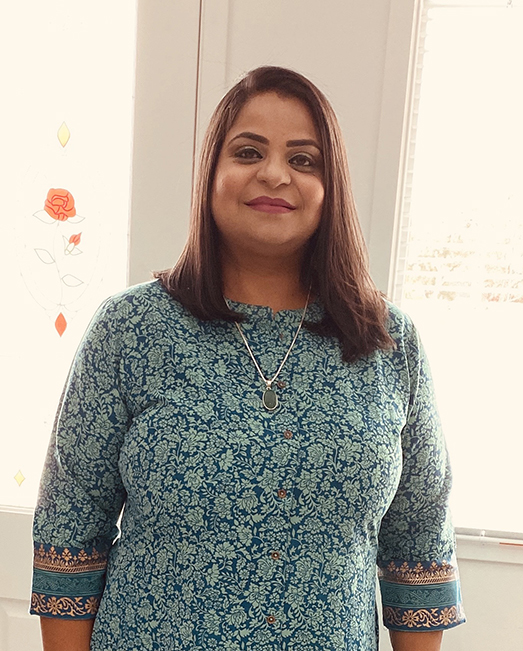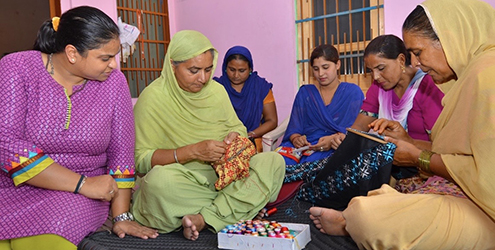Community
Copyright@ Australian Catholic University 1998-2026 | ABN 15 050 192 660 CRICOS registered provider: 00004G | PRV12008
Copyright@ Australian Catholic University 1998-2026 | ABN 15 050 192 660 CRICOS registered provider: 00004G | PRV12008

Two decades ago, Preeti Kansal was faced with a choice. Does she follow her passion and pursue a life of social service? Or does she succumb to Indian custom and agree to get married?
Her parents — in an earnest bid to secure their daughter’s happiness — planned to marry her off once she completed postgraduate study. But Preeti had other ideas.
“It was towards the end of my human rights course that I decided to register my NGO. I went to my parents and said, ‘I am going to start working in villages, helping women’. And they were like, ‘Oh my … what are you doing? You are going to get married!”
As the daughter of a leading industrialist in Ludhiana, the economic hub of Punjab, Preeti could have taken the easy road and lived a leisurely and luxurious life. Instead, she chose to spend her days in some of the state’s most impoverished villages.
“It was shocking for my parents that I had decided not to get married, because my father is a successful businessman and is very well-known in my city … at that time, it was uncommon for a young Indian woman from a well-known family to work in villages,” she says.
“They weren’t very approving, but I just stuck to my resolve in wanting to help impoverished women. My attitude was, ‘I want to help people, and by doing this I’m not doing anything wrong; I am trying to make a difference’.”
Preeti wasn’t transcending the bounds of traditional Indian society for the sake of it. Years of study and exploration had led her to an incontrovertible truth: that her country needs to encourage the greater economic participation of women.
Despite her family’s initial disapproval, they ultimately supported her choices, and in 2004 she established the not-for-profit Aagaz Charitable Foundation, to give rural Indian women greater access to financial freedom.
“The organisation serves two main purposes: firstly, to support women and children and provide them with an enriching environment; but secondly, and perhaps more importantly, to empower these women in the villages and to prime them for financial independence,” says Preeti, now 42.
“India is a male-dominant society and in many rural areas the attitudes towards women are still very regressive. We have problems with family violence, drug and alcohol abuse and mental health issues. There is still a stigma around these issues, so they are not discussed in any meaningful way.”
Preeti set up Aagaz with a goal of connecting disadvantaged women with training and work opportunities they could access in their own homes.
She teamed up with the College of Home Science at Punjab Agricultural University to run a range of educational programs, starting in the village of Atiyana.
“When we first went into these communities, we saw that it was quite common to find women who could do some embroidery or stitching, so we decided we would get some teachers from the college to help these women to refine their skills,” says Preeti .
The women are trained in the art of phulkari, the folk embroidery of Punjab, giving them a chance to make a living out of an age-old craft.

Preeti (left) with phulkari program participants
“We provide them with the raw material, and they make phulkari and other handicraft items, which are then sold online, and the women get paid irrespective of their sales” she adds.
“It has allowed these women to provide for themselves, so they do not have to rely on their husbands, and they can run their household independently. It also gives them a better life — a sense of confidence and self-respect — while preserving a traditional skill that their mothers and grandmothers were also engaged in.”
In the beginning, Preeti faced many hurdles. She worked hard to earn the respect of the villagers, who were wary of a high-caste woman coming into their communities.
Her first step was swapping her jeans and shirt for the traditional salwar kameez. Then she looked for opportunities to earn their trust — for example, by funding free dental clinics, and lobbying local authorities for improved infrastructure.
“When the people started to get to know me, the kind of a person I am and what my aims were, they warmed up to me and accepted me,” Preeti says.
She even donned her jeans in the village. “They started to call me, ‘jean-wali madam’, so that was a sign I had earned their respect.”
Before long, the program spread to other communities. It is now run in eight villages within a 50-kilometre radius of Ludhiana, with plans to branch out in the coming years.
Aagaz’s contributions expand well beyond the phulkari program. It also runs personal hygiene clinics, group counselling sessions, a range of awareness programs, and an annual Teej festival, a Sikh event that celebrates women.
In 2008, Aagaz won the Godfrey Phillips Bravery Award, for its “social acts of courage” and “rural upliftment”.
Preeti says the NGO doesn’t “do charity in the traditional sense”.
“We don’t do fundraising, and there are very few handouts, unless somebody in the community needs medical treatment or urgent surgery, or they need funds for further education,” she says. “In that case, we will step in and pay for it — but mostly it is about providing women and children with opportunities to uplift themselves.”
Preeti arrived in Australia as a permanent resident in 2015, having been accepted in ACU’s Master of Social Work.
Although she had years of study and more than a decade of experience in the not-for-profit sector, she soon realised she had a lot to learn.
“It was real eye-opener for me and a time of self-reflection, because in hindsight, I can see that I made a lot of mistakes with Aagaz,” Preeti says.
“Don’t get me wrong, we have done a lot of great work and the outcomes have been very good for the communities, but those same outcomes could have been achieved more effectively by working differently.
“It was only while doing the Master of Social Work that I gained theoretical knowledge which I can apply to do things better.”
That greater self-awareness extended to the freedom she holds in India coming from a privileged background.
Although the caste system has long been outlawed, discrimination against Dalits — a term used for members of lower castes — is still omnipresent.
“As a social worker in Australia, even if you are in a position of power, you never allow that power imbalance to influence your work with clients, and that’s non-negotiable,” Preeti says.
“In India, it is very different, because if you hold power you are powerful, and even if you’re in a village working for an NGO, you can use that power to implement change and get the work done.
“I can see the problems with that now, whereas when I was in India, the problems weren’t visible to me. I wasn’t aware.”
Since graduating from ACU, Preeti has been working as a social worker with the ACT Government.
“It’s been such a good experience, to be able to continue my passion of helping people, helping children and families,” she says. “I have been quite blessed to have the opportunity to do this in another country, and to learn things that I can apply in my organisation.”
Preeti is in the process of setting up a branch of Aagaz in Canberra, to provide new migrants from culturally diverse backgrounds with support in mental health, family violence, school bullying and social inclusion.
She feels a sense of contentment that she’s using her life to help others, and says her parents set her a good example by putting their wealth to good use.
“When I was younger, I would see my parents being quite generous, helping people in the community, and I think I picked that up from them,” she says.
“They are wealthy people but they donate a lot of money to different causes, and they’ve been really helpful with Aagaz too, so I think they led me down this path, even though they were not so supportive in the beginning.”
As for her choice to shun the traditional route of marriage, Preeti has no regrets.
“It’s still very unattractive to me: the idea that my parents were to look for a partner for me , and then there’s a settlement with your husband’s family on the dowry for a huge amount of money, or a big car like a Jaguar … I’ve never liked that idea,” she says.
“For me, that money would be better spent on other people, where it’s needed, and in India, that’s in the villages, doing everything we can to uplift the lives of our women and children.”
Want to pursue a career in social work? Explore the options.
Copyright@ Australian Catholic University 1998-2026 | ABN 15 050 192 660 CRICOS registered provider: 00004G | PRV12008